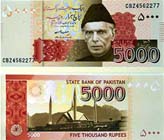Pakistan rupee closes record down on weak agri-economy

![]() Karachi - The Pakistani rupee continued to tumble against the US dollar and other major currencies on Tuesday as new reports on agriculture painted bad picture on economy, dealers said.
Karachi - The Pakistani rupee continued to tumble against the US dollar and other major currencies on Tuesday as new reports on agriculture painted bad picture on economy, dealers said.
The rupee closed record low at 69.70/69.90 against the dollar in the inter-bank market, dealers said. The rupee was closed at 69.60/69.80 on Monday against the dollar.
In an unofficial open market too the rupee plunged further against the dollar to close at 70/70.10 against the dollar versus Monday's 69.80/69.90.
Dealers say import pressures and continued bad reports on economy are the main reasons for the rupee's slide.
Market sources, quoting Ministry of Finance officials, say Pakistan's growth rate has dropped second time to 5.78 per cent against the already revised target of 6 per cent.
The actual growth target for 2007-2008 (July-June) was 6.5 per cent.
"The further reduction in the GDP growth target also created uncertainty over the economy," said Nabeel Iqbal, Marketing Manager at Khannai and Kalia, Pakistan's largest foreign exchange firm.
Low agriculture output creates further import pressures on the cash-strapped Pakistan, already saddled under rising oil import costs as Pakistan imports 85 per cent of its energy needs.
Pakistan is planning to import 2.5 million tones. New market reports suggest Pakistan will face also a shortfall in cotton output.
Cotton and textiles are backbone of Pakistan's economy.
In addition to revising down expectations for the overall economy, the government has also revised three times its cotton output target for fiscal 2007-2008 to now 11.6 million bales from 12.8 million, which had originally been 14.14 million bales.
Nearly all the main targets have been drastically reduced. The large-scale manufacturing sector has also been hit by a reduction to 4.8 per cent against 12.5 per cent target.
Service sector got a surprising boost mainly due to growth in the financial sector, so far immune from Capital Gains Tax (CGT) and Wealth Tax.
"Any imposition of CGT and the Wealth Tax in the new fiscal year (starting July 1) will have impact in the financial sector also," said Iqbal.
The central State Bank of Pakistan has also lost around 4.18 billion dollars in the last around five months from the peak of 16.48 billion dollars in October last year, creating further vulnerabilities for the market.
The latest data by the central bank reveals a decline by 49 million dollars to 12.20 billion on week ending May 10. The reserves are mixture of the central bank's own reserves as well as foreign exchange accounts by private commercial banks.
Last week, rating agency Standard & Poor's cut Pakistan's long- term currency debt sovereign rating to B from B+, citing expanding fiscal and external imbalances in the background of a volatile political setting.
Political uncertainty is also a contributing factor in the weakening of the rupee.
Pakistan's ruling coalition entered a crisis last week following the resignations of nine ministers - including Finance Minister Ishaq Dar - from the federal cabinet. The ministers, members of major coalition partner Pakistan Muslim League party of former premier Nawaz Sharif, stepped down over how and when to reinstate judges deposed by military dictator-turned-civilian President Pervez Musharraf last November.
Despite the fact that Sharif has pledged his continuous support to the new government led by slain former prime minister Benazir Bhutto's Pakistan Peoples Party, it stands on shaky ground, creating worries among business communities. (dpa)